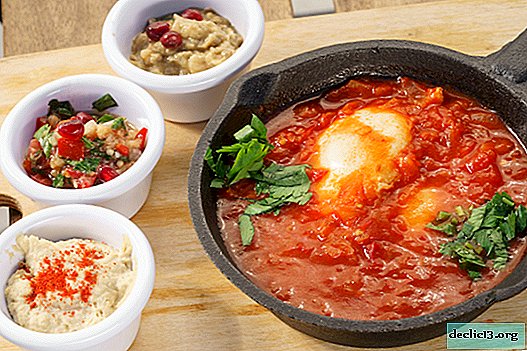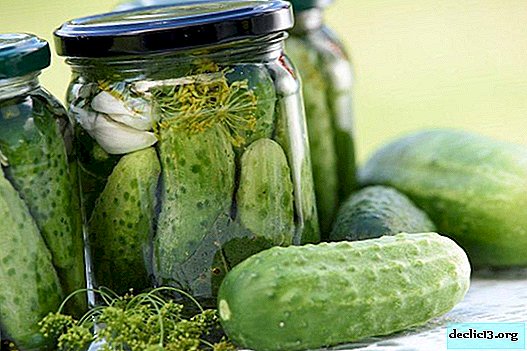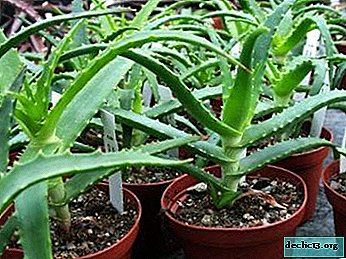National Israeli Cuisine - 12 Traditional Dishes
In the country of sultry deserts, a mixture of religions and the eternal sun, they like to eat hearty and tasty. It's about the national cuisine of Israel. For many decades, the state received immigrants who, in addition to traditions and cultural values, brought recipes for their favorite dishes. National Israeli cuisine is a combination of oriental flavor and European classical traditions. What to try in Israel to get acquainted with the culinary preferences of the inhabitants of the promised land.

Israeli National Cuisine - Features
The national cuisine of Israel is much like Mediterranean. Fresh vegetables, various legumes, fish, and fruits predominate in the diet. At the same time, local residents divide the national dishes of Israeli cuisine into the following groups:
- Sephardic
- Ashkenazi.
Almost half of the population - Ashkenazi - are descendants of immigrants from Central Europe. Migrants from the Iberian Peninsula, France, Italy, Greece, and Turkey are called Sephardim. Culinary traditions were formed depending on the geographical location and climatic features. Ashkenazy prefer chicken broth, cimes, mincemeat, liver pate. Sephardic prefer cereals, fresh vegetables, herbs, fruits.

The main feature of national dishes and cuisine in general is kosher. The fact is that Israel worships religion, so shops and restaurants strictly adhere to the rules specified in the national code of laws of Halacha, based on the commandments of the Torah. The code of rules explaining which food can be eaten and which cannot be eaten is kashrut. In accordance with the religious document, it is allowed to eat meat exclusively from animals that eat plant foods and at the same time are artiodactyls - cows, goats, sheep. As for poultry, in Israeli cuisine there are dishes from ducks, geese, chickens.

Pork and rabbit meat is considered unacceptable for eating. Also, fish and marine life that do not have scales and / or fins - shrimps and lobsters, octopuses, oysters, etc., were included in the list of prohibited products.
In addition, in Israel it is not customary to eat meat and fish dishes with dairy dishes together. For example, a restaurant will never serve a meat dish with cheese or cream sauce.
Important! Observing kashrut in Israel is quite simple - there are practically no non-kosher products in stores and restaurants, and during fasting and religious holidays, stalls with such products are hung with cloth and are not sold.
Traditional Israeli cuisine
What to try in Israel from food to better understand the culinary preferences of the locals? It is best to start with street food, especially since in Israel it is not only tasty, but also healthy.
HummusThe appetizer is a golden pasta seasoned with olive oil. Hummus is sold along with pita, a tortilla that is wrapped with paper for convenience. Such food can be a snack before the main lunch or dinner, or the main course.

On a note! Locals do not recommend starting a meal with hummus, in which case you are unlikely to try other Israeli dishes, because the food is so tasty that it is very difficult to stop.
If you want to try hummus as the main national dish, choose masabaha - a paste based on chickpeas puree, seasoned with olive oil, lemon juice, garlic, paprika. The obligatory component of the dish is tkhina - sesame seed paste. Food is served with eggplant, salted cheese. If you are too hungry, choose kavarma - in this case, hummus is served together with fried meat and vegetable salad.
In addition to hummus, burekas, falafel and al-ha-esh - Israeli kebabs are common in Israel.
BurekasThe food has Turkish and Balkan roots. The main feature is the standard form of the dish by which you can determine the filling:
- square - potato filling;
- triangular - cheese filling;
- round - any other filling.

The popularity of burekas is comparable to the popularity of pies and pancakes in Slavic cuisine.
Interesting fact! The word burekas comes from the Turkish "burek" - bread, but the ending "as" is borrowed from the Jews living in Spain.
By tradition, burekas eat Saturday morning. For their preparation, puff pastry is used, although before food was prepared from a wide variety of dough. As the filling, use potatoes, mushrooms, feta cheese, cottage cheese, spinach. Sweet burekas filled with apples, berries, cottage cheese with raisins are common.
FalafelAn uninitiated tourist can easily take these balls for meatballs, but in fact it is a meal of legumes, minced to a state of mashed potatoes, and fried to a golden crust.

Good to know! The dish appeared in ancient Egypt, it was invented for the period of fasting as an alternative to meat balls.
By the way, preparing food on your own at home is difficult. The original recipe contains a huge amount of ingredients, and the method of preparation is quite difficult.
BabaganushEggplant can be safely called the national vegetable of Israel, dishes are prepared in different ways, for breakfast, lunch and dinner. Most often, eggplant is fried over an open fire to give a smoky flavor, and they serve food with yogurt sauce and herbs.

As for the Babaganush dish - this is a paste made from eggplant, with the addition of sesame seeds paste, lemon juice. Food is served with pita. Many housewives cook babaganush at home.
Another vegetable dish made from finely chopped tomatoes, bell peppers and onions. The vegetable mixture is seasoned with coriander and other spices. Eggs are broken on top of vegetables. The dish is traditionally prepared for breakfast. The Israelis say that it is impossible to spoil such food, it always turns out delicious.
 Chollt or Hamin
Chollt or HaminRegardless of how you pronounce the name of the dish - cholnt or hamin - you will still be served a delicious roast. The fact is that food from the same components - meat, potatoes, chickpeas and beans - is called differently by different peoples. Sephardic people call roast khamin, and ashkenazi - cholnt.

Fish of St. PeterInteresting fact! Israel has a religious tradition, according to which cooking on Saturday is strictly prohibited. In connection with these housewives came up with a dish that put cooked in the oven on the night of Friday to Saturday.
The dish is associated with the gospel, namely with the apostle Peter. According to legend, the apostle once caught a telapia fish and found a coin in it, which he paid against the temple tax. Since then, telapia has become a cult food in Israel, traditionally it is grilled and served with potatoes and fresh vegetables.
 Malauah
MalauahFood has Yemenite roots, however, the people of Israel have changed it to their personal preferences. Malauah is a pancake made from fresh puff pastry. Serve it with different sauces - spicy, sweet or add the filling.

Israeli saladInteresting fact! Malauah is not inferior in popularity to street food in Israel - hummus and falafel. Israelis are not indifferent to any kind of bread, so in their traditional cuisine there are so many dough dishes.
The food is amazing in that wherever you try it, everywhere it is delicious. At first glance, this is an ordinary vegetable salad made of tomatoes, bell peppers, cucumbers, lemon, onions, garlic and olive oil. The peculiarity of the dish is the dressing, which is prepared from the fruits of the sumac plant.

JahnunGood to know! In different institutions, the composition of the salad may vary - add carrots, parsley. All ingredients are cut very finely.
Another dish that has Yemeni roots. The food is a sausage of dense consistency. Having tried them once, many housewives are interested in what dough the Israeli dish Jahnun is made from. Puff pastry is used, it is rolled out in such a way as to get as many layers as possible - 8-10, add honey from dates on top.

Interesting to know! The dish turns out to be very high-calorie; most often it is eaten for breakfast with eggs, tomatoes and Yemeni sauce, which is prepared from hot pepper, garlic and spices.
Desserts of Israel
In the national cuisine of Israel there is a large selection of sweets - halva, baklava, donuts, pies with various fillings, candied fruits.
KnafeOne of the most interesting desserts is knafe. Food is made from goat cheese, as well as Cadaific vermicelli. Before serving, pour the dish with sweet syrup, garnish with chopped almonds or any other nuts.

Interesting fact! Knafeymeet original salty and sweet taste, which will not leave indifferent any gourmet.
 "Sweets of Jafar"
"Sweets of Jafar"To achieve a bright orange color, food coloring is added to the food. It is believed that dessert is best prepared in the confectionery Sweets Jafar, which is located in east Jerusalem. Guests are captivated not only by a large assortment and amazing taste, but also by a homely, welcoming atmosphere. The confectionery has been operating for seven decades, the first owner of the establishment was Mahmoud Jafar, who was known in the city as the king of knafe, today his sons are meeting guests.
HalvaGood to know! A microwave is never used in a candy store; food is cooked only in a wood-burning oven. The cost of knafe for 1 kg is about $ 15.
Halva can be safely called the traditional dish of Israel and this is not surprising, given the love of local residents to sesame seeds sauce. In any grocery store there is equipment for crushing seeds, then lemon juice and honey are added to the sauce. In Israel, there are a huge number of halva recipes - chocolate, nuts, and dried fruits are added to the base. Dessert is eaten with a spoon, washed down with tea.
 Find out RATES or book any accommodation using this form
Find out RATES or book any accommodation using this formGastronomic excursions in Israel
Of course, the main purpose of visiting Israel is not culinary excursions, but to visit several such events will be interesting and informative. Here are some of the most exciting excursions.
- Religious bakeries. Returning to the religious theme, it will be interesting to visit the quarter where you can get acquainted with the baking of traditional festive challah bread. Part of the test necessarily belongs to the temple - this is one of the types of sacrifice. They eat challah on Shabbat and other religious holidays. Visiting a religious quarter requires a dress code.
- Wineries The tour allows you to immerse yourself in the world of winemaking, make sure that the process of preparing the drink is complex and long, try several wines to choose from and admire the beautiful landscapes.
- Tour of Jerusalem markets. Many tourists who have visited Israel rightly believe that it is impossible to truly learn the country's traditions and get inspired without visiting the eastern bazaar. It is impossible to imagine any eastern market without food; here you can buy delicious sweets, fresh vegetables and fruits, and try street food.

The traditional cuisine of Israel is a harmonious combination of oriental and Mediterranean traditions. We presented the most interesting food, and you can choose dishes to your liking. Israeli cuisine - delicious and satisfying, as a rule, tourists are unable to lose weight when traveling through the cities of the country.

















